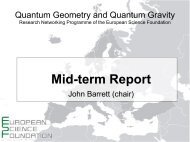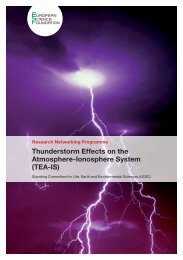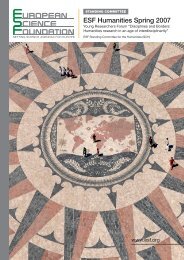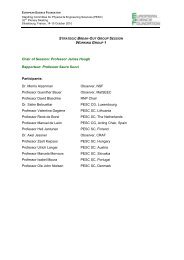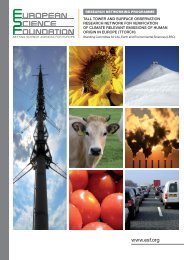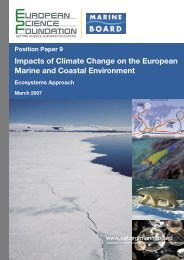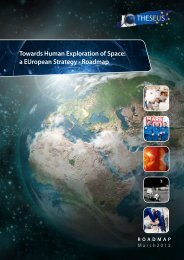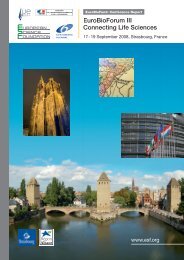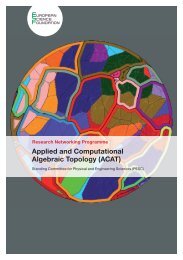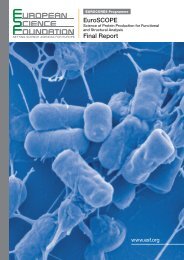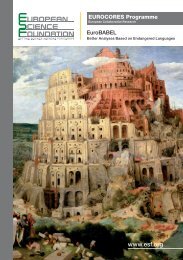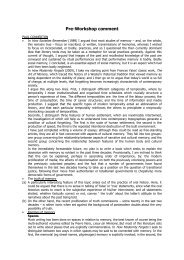Synthesis Report - European Science Foundation
Synthesis Report - European Science Foundation
Synthesis Report - European Science Foundation
Create successful ePaper yourself
Turn your PDF publications into a flip-book with our unique Google optimized e-Paper software.
for sustainable development are still weakly institutionalisedcompared to traditional disciplinaryscience, but are the methodological and practicalbackbone of knowledge as an open system.There is a need to address the procedural, political,institutional and, last but not least, culturalbarriers within and between institutions. This initself requires that educational institutions take onthe mandate for training researchers and practitionerswho can deal competently with diversity andcomplexity in their institutional environments.Evaluation of academic institutions also needsto include useful measures of the outcomes of publicengagement in terms of changes in attitudes,behaviour and policies and thus reward academicfaculty and corporate researchers for engaging substantivelywith the public and policy makers.Leading institutions such as the ColumbiaUniversity (USA) Committee on Global Thought(CGT)32, led by Nobel Laureate Professor JosephStiglitz, have recognised “that many of the world’sproblems, such as poverty, inequality and governance,fall increasingly in the spaces between academic disciplines.”Taking action, the CGT asks: “How doesa University create Global Citizens” and “initiallyaims to identify underrepresented viewpoints thatlink the disciplines.” The RESCUE Vision needs tobe supported by similar efforts in <strong>European</strong> universities.The barriers to both interdisciplinarity andtransdisciplinary education are numerous, andhave been widely discussed in the literature. Theseinclude a combination of structural, cultural andcognitive barriers and problems related to disciplinesas social institutions (Buanes and Jentoft,2009). It has been argued that the structural barriersare the easiest to address, whereas cultural barriersare more persistent: “What makes disciplinesso inflexible and interdisciplinarity so difficult isnot only that disciplines are formed around oneor a few aspect visions, but that they also harbourstrong truth perceptions that are so much takenfor granted that any empirical test is unnecessary”(Buanes and Jentoft, 2009, p. 451). Overall, the academicinstitutions should become more adaptive inorder to allow the transformation of knowledge forsustainability (e.g., Miller et al., 2011).For the RESCUE Vision, an educational systemmust be developed that is closely coupled to interdisciplinaryresearch. The need for strategic focuson interdisciplinary research by universities givena changing global [human and natural] environ-Good Practice Example:Master’s Degree in Sustainability <strong>Science</strong>and PolicyLocation: Maastricht University,The NetherlandsThe new Master of <strong>Science</strong> in Sustainability<strong>Science</strong> and Policy (MSc SSP) provides an intensiveprogramme where students will acquireknowledge and skills (competences) to dealwith one of the world’s most relevant and complexquestions: how can we balance ecological,economic and social developments for ourpresent and future well-being? The programmeaims to meet the need for scholars who aretrained in interdisciplinary and integrativeapproaches towards sustainable development,enabling them to assess and deal with the complexityinvolved from a system’s perspective.Furthermore, it aims to train professionals whoare able to cross ‘boundaries’ between differentdisciplines and domains, and that can operateat the interface of science, policy and society.The Masters programme will create a uniqueopportunity for students to specialise in sustainabilityscience and policy, and especiallyin sustainability assessment, through an interdisciplinarycurriculum in an internationalambience. The MSc SSP is characterised as a‘society-oriented Master’.More information: www.icis.unimaas.info/education/must/ment is not new. Jantz33 states: “In response tovarious pressures for change arising from the presentsituation, the university will have to adopt anew purpose which may be recognized as a meansof increasing the capability of society for continuousself-renewal. With this new purpose in mind,the structure of the university will be determinedby the concept of an integral education/innovationsystem…”. Clearly while some <strong>European</strong> universitiesalready have a strategic focus on educating the nextgeneration of citizens able to contribute effectivelyto society in a changing global environment, manyare still practising ‘business as usual’. Sustainabilityresearch networks between universities and othereducational institutions are spreading and gainingmomentum. The Sustainable Development ResearchNetwork (SDRN)34 and the Global University33Responses to Environmental and Societal Challenges for our Unstable Earth (RESCUE)32. See . See cgt.columbia.edu/about/mission andcgt.columbia.edu/about/committee33. www.springerlink.com/content/p8642kgv2814737234. www.sd-research.org.uk



